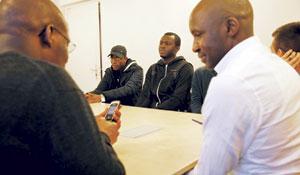
Gay asylum seekers talk about their experiences at ARDHIS. Credit: Barbara Laborde
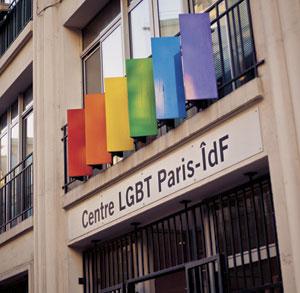
The Paris LGBT centre is a welcoming space for gay asylum seekers trying to find a new home in France. Credit: Sergei Yahchybekov
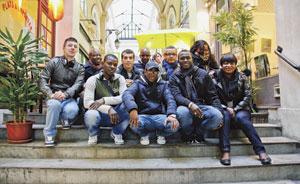
Asylum seekers in the ARDHIS group. Credit: Barbara Laborde
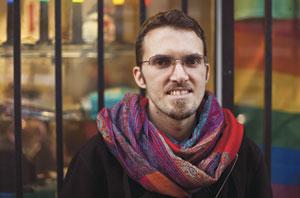
Ludovic Zahed founded HM2F, a group for gay Muslims in France. Credit: Sergei Yahchybekov
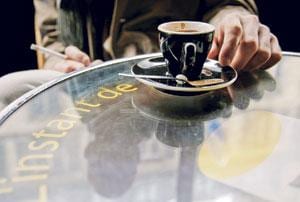
The streets of the City of Love are not always friendly places for refugees from the developing world. Credit: Sergei Yahchybekov
It is a Saturday morning in the heart of the Marais, Paris’s well-known gay district. A young African man paces nervously in front of the Centre LGBT Paris-Île-de-France, hands in his pockets, staring nervously at the unopened door.
Ibrahim Touré came to France from Ivory Coast in October 2011, on false documents. He says he is gay, and his sexual orientation had become known in his neighbourhood back home. He continued to stay on good terms with his ex-wife and small daughter and to work as an Abidjan taxi driver until civil war broke out in the country in late 2010.
“The new group that has come to power since the electoral crisis are Islamists, and they detest gays,” says Touré, who is himself a Muslim. “There is a threat to my life, and I can’t go back.” Touré lived in metro stations and shopping centres in Paris before an acquaintance told him about a Red Cross shelter. He has been living there for several weeks while he explores other options.
“I didn’t even get a chance to say goodbye to anyone. I was working and my grandmother called and said the militias had come looking for me. My brother helped me get to the airport. I just left. I decided to claim asylum . . . I couldn’t even call my grandma back.”
Touré is afraid he will be sent back to his home country. It’s a logical fear: according to Philippe Colomb, president of the Association for the Recognition of Rights of Homosexuals and Transsexuals to Immigration and Residence (ARDHIS), France accepts only 11 percent of political asylum seekers, regardless of the reason. On appeal, that number rises to 24 percent. No specific statistics are kept for sexual orientation–based requests.
“This is too many people to whom France says no,” Colomb tells a group of about 60 asylum seekers of all ages, races and stages of the process. “We need to get you the strongest files possible.”
Touré’s journey, like that of the dozens of other newly arrived and hesitant queer refugees crowding the centre’s monthly information session, is only beginning.
Asylum seekers in France must first register with local police, then make an asylum request with the French Office for the Protection of Refugees and Stateless People (OFPRA), explains Frédéric Chaumont, asylum accompaniment coordinator at ARDHIS. After submitting a summary of the facts, the asylum seeker is called to an interview with an OFPRA officer. This process takes three months to a year.
Chaumont says OFPRA decisions “generally come within three months but can take 12, 16 or 19 months.” During this time, he says, asylum seekers cannot legally work and struggle to survive.
“The most frequent response is a quick refusal,” Chaumont says. The refusal sometimes includes a deportation order.
“If there is no deportation order, or if it has been successfully contested, the asylum seeker is summoned to the national asylum seekers’ court after a waiting period that sometimes lasts a year,” Chaumont says. “The hearing lasts 30 to 45 minutes — much too short — and the decision is made public within three weeks.”
The pressure is on the asylum seekers to make their files as solid as possible. “It’s your word against theirs,” Chaumont tells the crowd of would-be refugees. “If you received threatening letters, we need photocopies. If you were arrested or something else happened, we want police reports.”
The majority come from West African countries where religious conservatism has a strong influence on local politics and being gay is a punishable offence.
Despite the fact some countries — including Senegal, Ghana, Benin, Tanzania and Bangladesh — imprison gays, they are on the French government’s “safe list,” making successful asylum claims from these countries much harder.
The non-EU countries of the former Yugoslavia are also on the “safe list,” although they are hardly welcoming places for gays. Many of the white faces in the room are from Serbia or Kosovo.
“The OFPRA uses the safe list to argue that human rights are generally respected in those countries and people who return to those countries won’t have any problems,” says Chaumont. “But in certain technically democratic countries . . . being openly gay is impossible, and you get negative reactions from the public, met with total passivity by the forces of law and order, and with implicit or explicit support from the religious authorities, and we mean all religions.”
Mali, for example, is on the “safe list,” but it isn’t for Mohamed, one young Malian man in the group. “My father had me arrested,” he says. “The store where I worked was set on fire.”
There are myriad horror stories, from all corners of the globe.
“There’s a very bad situation in Uganda,” says Judy, a table tennis coach who came to France for a conference in September and never left. “Even yesterday I read in the papers, they passed a law that says we are going to be hanged
. . . I am known as a lesbian; a bunch of us [gay activists] were seen on TV after the death of some of our activists, and people from the government started following us. If I were to go back to Uganda, they would send me to prison for life.
“I don’t know anything about anything,” says Judy, who speaks fluent English but no French. “I haven’t had my [OFPRA] meeting yet. I wish they will let me stay. My parents didn’t let me go to university because I [am] a lesbian, but I want to study graphic arts.”
Olga and her girlfriend came from Russia on a tourist visa. “The last straw was when I came out to my family and my mother and brother said they would rather I be dead than be lesbian,” she says.
Some stories end happily. More than once there is applause as someone announces his or her request has been accepted. Kemal, a young Turkish man who applied for asylum to avoid conscription in his home country, is all smiles. “Yesterday I got my status,” he says in English. “I’ll start learning French soon. In Turkey I studied international trade, so I’d like to look for some jobs in finance.”
Others’ stories continue indefinitely and may not end well.
“A lot of asylum seekers choose to stay in France, in secret, living in fear of being found out and seeing the destruction of whatever life they will have managed to build,” Chaumont says. “It’s a challenge for them to see that the paradise they’ve dreamed of might not be as welcoming as they’d imagined.”
Touré says he has no choice; he will stay in Paris whether he gets his papers or not. Olga and her girlfriend disappear from the meeting unnoticed, swallowed up by Paris, before Chaumont and his volunteers can register their names.
For those who grow up in religious environments, balancing faith and sexual orientation is an added challenge, even in France, where close-knit immigrant communities can be as homophobic and closed as they are back home.
“I’m a Muslim, I’m a homosexual, and people don’t like that,” says Touré.
When I tell him that in France there are some practising Muslims who don’t hide their sexuality, his eyes light up. “Really? At the same time?”
Ludovic Zahed, a doctoral student who founded Homosexual Muslims of France (HM2F), says there is no simple answer for those who want to embrace their religion, culture and sexuality.
“When I was a teenager I was very religious, very observant; I knew half the Koran by heart,” says Zahed, who was born in Algeria but came to France as a small child. “But at 17 or 18 I accepted that I was homosexual, that I was in love with this boy at the mosque and it was more than brotherly love. Now, in Islam that is forbidden. I found out I was HIV-positive at 19 and they said that was some kind of punishment.”
Zahed estimates that out of the dozens of Muslims, mostly youth and students, who have joined his association, only about 10 percent are practising. He is one of them.
He says he does not believe homosexuality is against the Koran, but he knows he has work to do to convince other Muslims of that.
“We are doing long-term visibility work, because the more visible we are, the fewer Muslims will see this as a problem, and the fewer Muslims will say it doesn’t exist. We also need to keep welcoming people like us.”
Jamel, who leads the group’s prayer and meditation committee, says, “I waited three years to find an association like this. For me, there is no incompatibility between sexuality and religion . . . God doesn’t want to keep people from being who they are.”
But Jamel says his family, from the Indian Ocean nation of Mauritius, doesn’t agree. “My mother and father are very traditional, very strict, and what other people say is important for them,” he says. “In my country, if you say you’re homosexual, people will pity you and reject you, and say, ‘What did we do to deserve this?’ There are some people who show their sexuality, who have a pride parade, but you have to be really strong to do that.”
Jamel’s parents don’t know about his sexual orientation, but he thinks they suspect something. In France on a student visa, he doesn’t know if he will go back home once his studies are finished. He worries about the job market in France and the paperwork involved in staying legally.
Mohamed, from Ivory Coast, and Salim, from Algeria, also live double lives. In France they are active in the gay immigrant community, but in their home countries, they are not out to anyone.
Unlike Touré, who is ethnically African, Mohamed is from the Ivory Coast Lebanese community. There, he says, “the society is homophobic, but sexuality is just not a subject that excites people. You can live [your sexuality] if you do it anonymously. When I get back, I’ll have to make a choice.”
For Salim, however, switching lives became a bit too difficult. “Before [in Algeria], I had no gay life,” he says. Salim originally came to France on a student visa. “In France, I’ve been very out. When I went back to Algeria for vacation, I didn’t say anything.”
He returned to France the day before his student visa expired and filed an asylum claim. He has also filed a claim with Citizenship and Immigration Canada, after getting a good impression of the country while on a work term in Montreal.
“Both countries are studying my case,” he says. “If Canada says yes, I’m going back there, because I love the two countries, Canada and France.”
In the meantime, Touré, Salim and dozens of other gay asylum seekers will remain isolated and in limbo in Paris, fearful of their illegal or irregular status, but much more fearful of being sent back home.
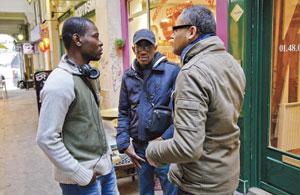

 Why you can trust Xtra
Why you can trust Xtra


